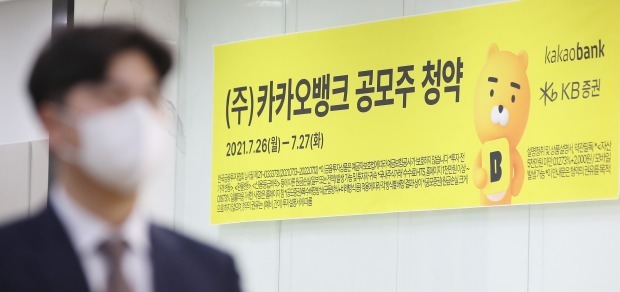South Korea’s largest mobile-only bank, KakaoBank, will have its much-anticipated initial public offering Friday, seeking to raise 2.55 trillion won ($2.23 billion) on the country’s main bourse. Its market debut has been drawing excitement from investors who expect the mobile banking arm of Kakao to hit the jackpot, but skeptics warn of risks that there will be “too many” stocks available right after its IPO, as well as its heavy reliance on retail banking in a heavily regulated industry.
KakaoBank‘s IPO has been at the center of market attention as its share price was set at 39,000 won or 56 times its book value, drawing criticism that its valuation is far too high. The price-to-book value of other banks in Korea on average is 0.44 times.
If shares hit the highest possible price Friday, investors are expected to enjoy a whopping 160 percent return on the first trading day. KakaoBank would also likely see its market capitalization surging to 46 trillion won, similar to that of Hyundai Motor, the world’s fifth-largest carmaker, under the same best-case scenario.
The figure is far higher than some 13 trillion won for Hana Financial Group and about 8 trillion won for Woori Financial Group -- two of South Korea’s four major financial holding firms.
Also, the IPO could easily place the company into the Kospi 200, a capitalization-weighted index, earlier than expected.
“Even considering the amount of undetermined supplies and other distributable supplies, KakaoBank will easily get an early incorporation into the Kospi 200 Index,“ said Jeong Kwang-myung, a researcher at DB Financial Investment. ”We expect a positive impact on short-term supply and demand due to inflows of passive money (which invest in indexes).”
In addition, unprecedented institutional investors’ interest during the book-building process might signal potential success for the digital bank that has 16.15 million registered users. The mobile-only bank drew an all-time high of 2,585 trillion won from 1,667 domestic and overseas institutional investors last month, oversubscribed by 1,733 times.
 |
Signage shows the schedule of KakaoBank’s initial public offering subscriptions that wrapped up on July 27, at a brokerage branch in Seoul. (Yonhap) |
On the flip side, however, retail investors showed less enthusiasm for KakaoBank’s IPO and the relatively high number of available stocks could take a toll on the stock price. Retail investors’ participation in the company’s IPO fell short of market expectations of setting a new record, attracting about 58 trillion won.
KakaoBank has far less mandatory holding than other blockbuster IPOs. Only 59.82 percent of investors guaranteed mandatory holding, while the rates for SK ie Technology and SK Bioscience were 64.6 percent and 85.26 percent, respectively. Mandatory holding by foreign institutional investors, even lower at only 27.36 percent promising to hold the stock upon the IPO, could lead to massive selling from their end.
Some have argued that its novelty and potential as a platform, which could enjoy synergy with its parent company Kakao, will allow it to bypass many limitations of traditional banks.
”Since the launch in 2017, KakaoBank has become the most used financial app, with the No. 1 monthly active users. So we can expect KakaoBank is just starting with scalability through the network effect and lock-in effect with KakaoTalk,” Kyobo Securities analyst Kim Ji-young wrote in a report Thursday with a target price of 45,000 won.
But skeptics point out that even though it’s a digital bank, it still shares some of the restrictions endured by traditional banks under such a heavily regulated industry and a similar business model as traditional banks that relies on interest income.
BNK Investment & Securities presented its target stock price of 24,000 won, 38.5 percent lower than its IPO price, saying KakaoBank did not properly reflect the value of the banking industry.
“The stock price at the current level already reflects growth potential as a bank and expectations for the platform business,” said Kim Eun-kap, an analyst at IBK Investment & Securities.
“It is hard to expect a meaningful increase after listing.”
By Park Ga-young (
gypark@heraldcorp.com)


![[Herald Interview] 'Korea, don't repeat Hong Kong's mistakes on foreign caregivers'](http://res.heraldm.com/phpwas/restmb_idxmake.php?idx=644&simg=/content/image/2024/11/13/20241113050481_0.jpg)

![[KH Explains] Why Yoon golfing is so controversial](http://res.heraldm.com/phpwas/restmb_idxmake.php?idx=644&simg=/content/image/2024/11/13/20241113050608_0.jpg)



